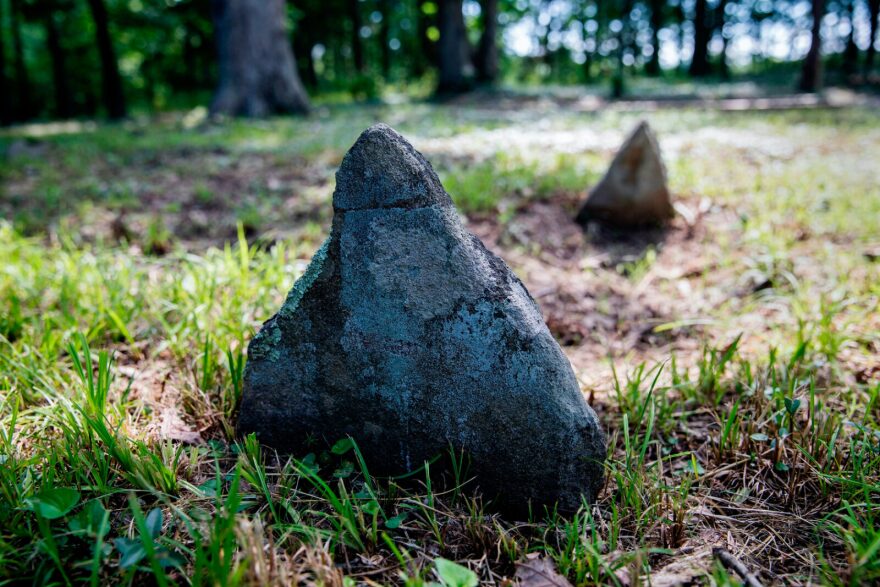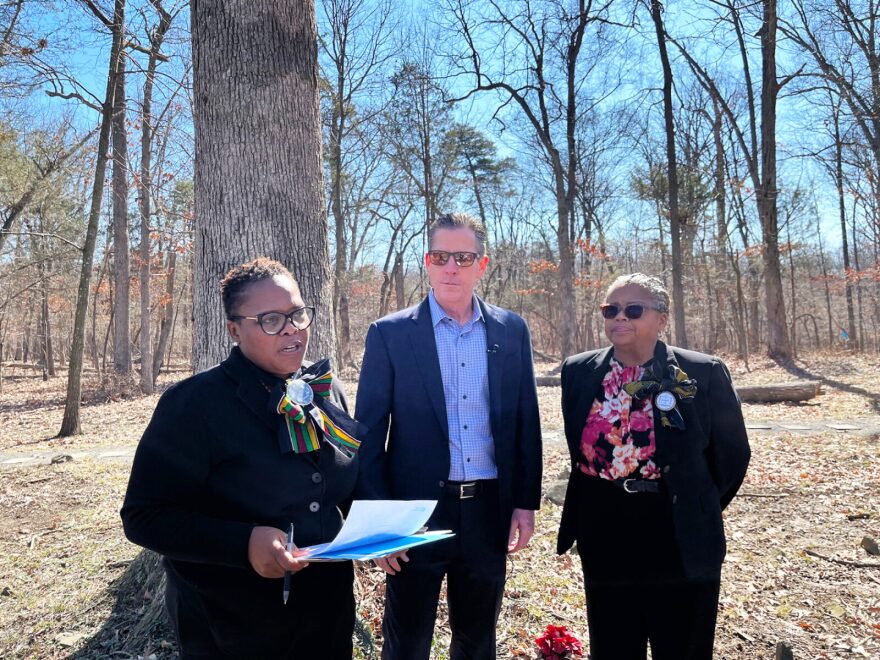Read the original article on WAMU's website.
The Rev. Michelle Thomas has big dreams for the Loudoun Freedom Center, an educational nonprofit that preserves, protects and conducts educational programming on the site of an historic burial ground for enslaved people in Ashburn.
Thomas visits the African American Burial Ground for the Enslaved at Belmont, off of State Route 7, nearly every day. She leads tours for schoolchildren and other community members, offering a window into the lives of the enslaved people forced to labor on the nearby Belmont Plantation, much of which is now a golf course. She tells the story of enslaved people who buried their loved ones in the dead of night and taught each other to read in secret in a windowless one-room building nearby. (Literacy was banned for enslaved Black people in Virginia.)
Thomas says she also visits the property to clear her head — and to mourn her son Fitz, the first free Black person buried there after he drowned in a 2020 accident.
“It means everything to me, because I understand this history, I understand the uniqueness of this shared history. I understand the struggle of ancestors who were forced to labor in the beautiful fields that we now golf in. … I know the history of people that want to be free,” Thomas told reporters at a recent press conference at the burial ground. “This is our opportunity.”
Thomas hopes to build a museum and visitor center on the site, a new indoor space for educational programming and to make members of the public welcome. She also wants to add a contemporary cemetery and demonstration gardens to show visitors the cash crops enslaved people were forced to tend on Belmont Plantation. But that vision is now endangered by a dispute over a planned transmission line on land adjacent to the current Freedom Center property.

Developer JK Land Holdings bought more than 100 acres abutting the burial ground earlier this year for $181 million. Company President Chuck Kuhn says he’s prepared to donate a 10-acre band of land stretching from the Freedom Center’s current 2.75-acre plot down to a nearby creek. That land is worth about $20 million.
But Kuhn says he’ll only move forward with the donation if he can also develop two data centers on the remaining land — a project he claims will be impossible if Dominion Energy moves forward with current plans to run a transmission line on the creek's southeast side, closer to where the proposed data centers would go.
“If we’re unable to accomplish the goal of our development, then we will not have the economics to afford us the ability to make the donation,” Kuhn said at the press conference last week.
Kuhn and Thomas are calling on Dominion to put the transmission line on the northwest side of the creek — closer to the Freedom Center, on a section of the 10-acre plot Kuhn plans to donate.

But Dominion, which plans to submit its proposal for the transmission line to the State Corporation Commission for approval in the next few weeks, is pushing back.
In a letter sent to Thomas and Kuhn, the utility argued its proposed site for the transmission line was responsive to concerns about the area’s historical resources and environmental impacts on the creek.
“[JK Land Holdings] have now asked us to move the transmission line route closer to the burial grounds and on top of an environmentally sensitive resource, a creek,” said Aaron Ruby, a Dominion Energy spokesperson. “And so, in the interest of historic preservation of the African American burial ground and in the interest of environmental protection of the creek, we cannot accept that change.”
In the letter, Dominion offered to donate money to fund a professional architectural rendering for the Loudoun Freedom Center building and to conduct a survey of the 10-acre plot near the burial ground using ground-penetrating radar to check for graves. The utility said it believes Kuhn’s data center project would still be possible even with the current transmission line route proposal, and promised to work closely with JK Land Holdings on “micro-siting” of the line — small adjustments to the route to accommodate the developer’s plans.
“JK Land Holdings and no one else is responsible for their decision to back out on their commitment to donate 10 acres to the Loudoun Freedom Center,” Ruby told WAMU. “This is their decision, and their decision has nothing to do with our proposed transmission line or any impacts it would have on their data center development.”
Kuhn insists the transmission line would conflict with plans for an equipment yard for back-up generators and cooling infrastructure.
“I don’t understand why, of all the battles Dominion has in the state of Virginia, they’re being so difficult on this small matter,” he said in a follow-up interview.
Kuhn also said his company had already performed a recent ground-penetrating radar survey of the area. The results, he told WAMU, showed no graves — and in fact, suggest an extensive rock outcropping underground, making burials there nearly impossible. Kuhn said JK Land Holdings offered Dominion the opportunity to review the results or conduct its own ground-penetrating radar survey in a letter sent last week.
Kuhn said he hopes to meet with Dominion leadership to attempt to resolve the dispute in person. But if the utility moves forward with the current route for the transmission line, Kuhn indicated JK Land Holdings might pursue legal action, which could mean costly delays for the transmission line and the data center project — and an uncertain future for the Freedom Center.
The impasse underscores the high cost of land in the D.C. region, and specifically in Ashburn, which is sometimes referred to as Loudoun’s “Data Center Alley” for its concentration of the massive warehouse-like buildings that host the physical infrastructure powering the modern internet. Loudoun is home to the largest data center market in the country, and the centers have proved a lucrative business for the developers building them and for the county’s tax base.
But the industry’s explosive growth has prompted public concerns about their impact on nearby environmental and historical resources, as well as on the region’s power grid. Officials in Loudoun County and neighboring Prince William County are increasingly eyeing ways to better regulate the industry, including proposals to tighten local controls over new data center development and raise taxes on the industry.
Amid all the development, Thomas is pushing for the largest buffer she can get to protect the burial ground.
Thomas says her priority is for the Freedom Center to own the land between the burial ground and the creek, which she believes could contain traces of the lives of her enslaved ancestors — perhaps fragments of pottery, buttons from their clothes or tobacco pipes. And if running a transmission line through part of the area is what’s required for the center to own it, so be it.
“I have fought for nine years to protect our history,” Thomas said. “I would never put our history at risk. If they hadn’t done the survey work, I wouldn’t support moving the power lines.”


